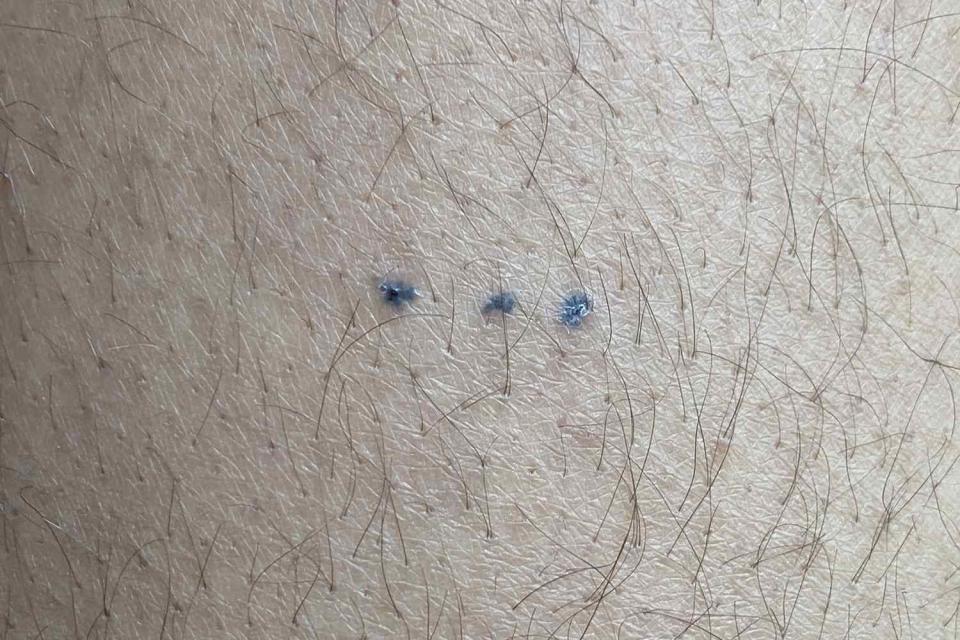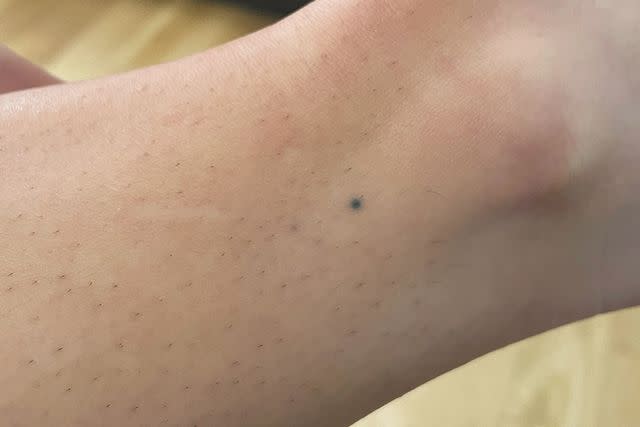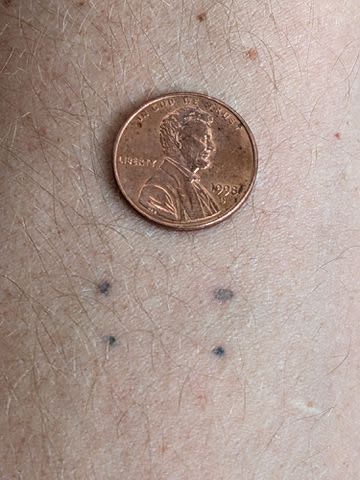Cancer Patients Undergoing Radiation Treatment May Soon Have an Alternative to Permanent Tattoo Markings
Researchers are looking into using temporary tattoo ink on cancer patients as an alternative to permanent tattoos during radiation therapy

Ephemeral Tattoo and Henry Ford Health
Ephemeral Tattoos For Cancer PatientsA recent study tested the safety and efficacy of made-to-fade tattoos for medical markings.
The study — conducted by Henry Ford Health and Ephemeral Tattoo — explored the use and implications of temporary tattoo ink on cancer patients as an alternative to the application of permanent tattoos during radiation therapy.
According to a press release, 50-60% percent of cancer patients receive radiation therapy during their course of treatment, which requires them to receive small, permanent tattoos to ensure therapy is delivered accurately to the exact same place every time.
Never miss a story — sign up for PEOPLE's free daily newsletter to stay up-to-date on the best of what PEOPLE has to offer, from juicy celebrity news to compelling human interest stories.
For many radiation patients, these tattoo marks serve as an unwanted reminder of cancer. In an effort to change this, researchers at Henry Ford Health partnered with Ephemeral Tattoo to test their made-to-fade tattoo ink on 15 cancer patients. Unlike permanent tattoos, Ephemeral Tattoo will last 6 to 8 weeks during treatment and then fade.
The study was created by Eric Schaff, M.D., Henry Ford Health radiation oncology resident, with the help of principal investigator Farzan Siddiqui, M.D., Ph.D., and research engineer Marissa Gilbert.
The biodegradable ink used was developed by Ph.D. chemical engineers, Vandan Shah and Brennal Pierre at Ephemeral Tattoo, the release states.
Dr. Farzan Siddiqui and Brennal Pierre recently spoke to PEOPLE to discuss what inspired this collaboration, the physical and psychological implications of these technologies, and how they hope to make waves in the health and wellness space at large.

Ephemeral tattoos and Henry Ford Health
Ephemeral Tattoo ApplicationWhat initially inspired the collaboration between Henry Ford Health and Ephemeral Tattoo?
FS: Almost all our patients who undergo radiation treatment require placement of tattoos for alignment on the machine for treatment. Whenever we are talking to our patients and we get to that part where we are describing the procedure and placement of the tattoo, eyebrows always go up because people are concerned why and how this will impact them. So, we were always looking for something that would not leave a permanent mark on our patients. And one of our residents, Dr. Eric Schaff who has graduated since, was instrumental in forming this link and connection. He was the one investigating the possibility of a temporary tattoo that we could use for our patients to serve the primary purpose of doing the radiation treatment, but then allowing it to fade over time.
Can you break down the application of these tattoos? What specific attributes make it ephemeral?
BP: Ephemeral Tattoo was designed as recreational tattoos initially. Basically, we wanted to get the same quality tattoos that a permanent tattoo would get. We wanted every client to essentially go through the same procedure that you would have with a permanent tattoo. What makes Ephemeral different is unlike permanent tattoos, it breaks down all the time. And how does it break down all the time? One of the main components of the tattoo is actually bioabsorbable polymers. These bioabsorbable polymers can be found in other medical devices such as sutures, otherwise known as dissolvable stitches. It’s that property of the ink, that ability to break down and be absorbed by the body over time, is essentially what makes ephemeral, ephemeral.
Have there been any adverse reactions to these tattoos?
FS: Some of our patients may be undergoing radiation treatment for a duration of six to seven weeks. So first of all, we wanted a tattoo that would not fade prematurely or too quickly. We wanted to make sure that during this whole process there would be no issues with the visibility of the tattoo. That was one of our primary endpoints of the study. The second endpoint was the safety of this new ink that we were using. Thankfully, of all of the 15 patients who were enrolled in the study, we did not have any unwanted reactions, allergies, excess pain or discomfort, or any other long term issues with the various tattoos that we placed on these patients. So again, we were able to meet the primary objective of using these tattoos to align the patients, while also meeting our safety benchmarks.
How is Ephemeral Tattoo different from other semi-permanent tattoos on the market?
BP: Most semi permanent or temporary tattoos on the market are placed on the epidermis of the skin which is the very surface of the skin. This part of the skin replenishes itself at least every two to three weeks. So in two to three weeks, that tattoo will be gone. What makes Ephemeral Tattoos really different is we essentially use the same tools that tattoo artists use where the ink is placed in the dermis of the skin, which is below the epidermis. Just like a permanent tattoo, it will remain there until you remove it. With Ephemeral, the same thing will happen, you place it in the dermis of the skin, and it will remain there. However, the bioabsorbable polymers will start breaking down, and then the tattoo will start being removed over time.

Ephemeral tattoos and Henry Ford Health
Ephemeral Tattoo ApplicationWhat are the physical and psychological implications of ephemeral tattoos for cancer patients?
FS: This is a painful journey for patients going through this whole process. It is both physically and mentally taxing. Radiation therapy can be curative and palliative, but this time in their lives is not pleasant for most patients. When they are healed and cured from their cancers, many prefer to put this experience in their rearview mirror and not have to think about it constantly. Having a permanent tattoo is a lifelong reminder of the struggle that they have been through. So, we’ve found that psychologically, once our patients have been cured, it would be beneficial for them to go on with their normal, healthy lives and not have this visible reminder. Additionally, some cultures and religions do not permit the placement of permanent tattoos. There are definitely religious exemptions in the case of medical procedures and thankfully none of our patients so far have refused to get a medically recommended tattoo, but it is always something we see with a little skepticism. With a temporary tattoo, hopefully we can avoid these cultural or religious prohibitions.
Do you suspect that there might be patients who want a more permanent symbol of their struggle?
FS: Yes, I’m sure there are patients who feel that since they have been through a difficult time and have triumphed coming out on the other side, they want something permanent to indicate that they have succeeded. Even if there are patients who want permanent tattoos, I suspect that a minority of patients will want the permanent tattoos versus the temporary ones.
For more People news, make sure to sign up for our newsletter!
Read the original article on People.


